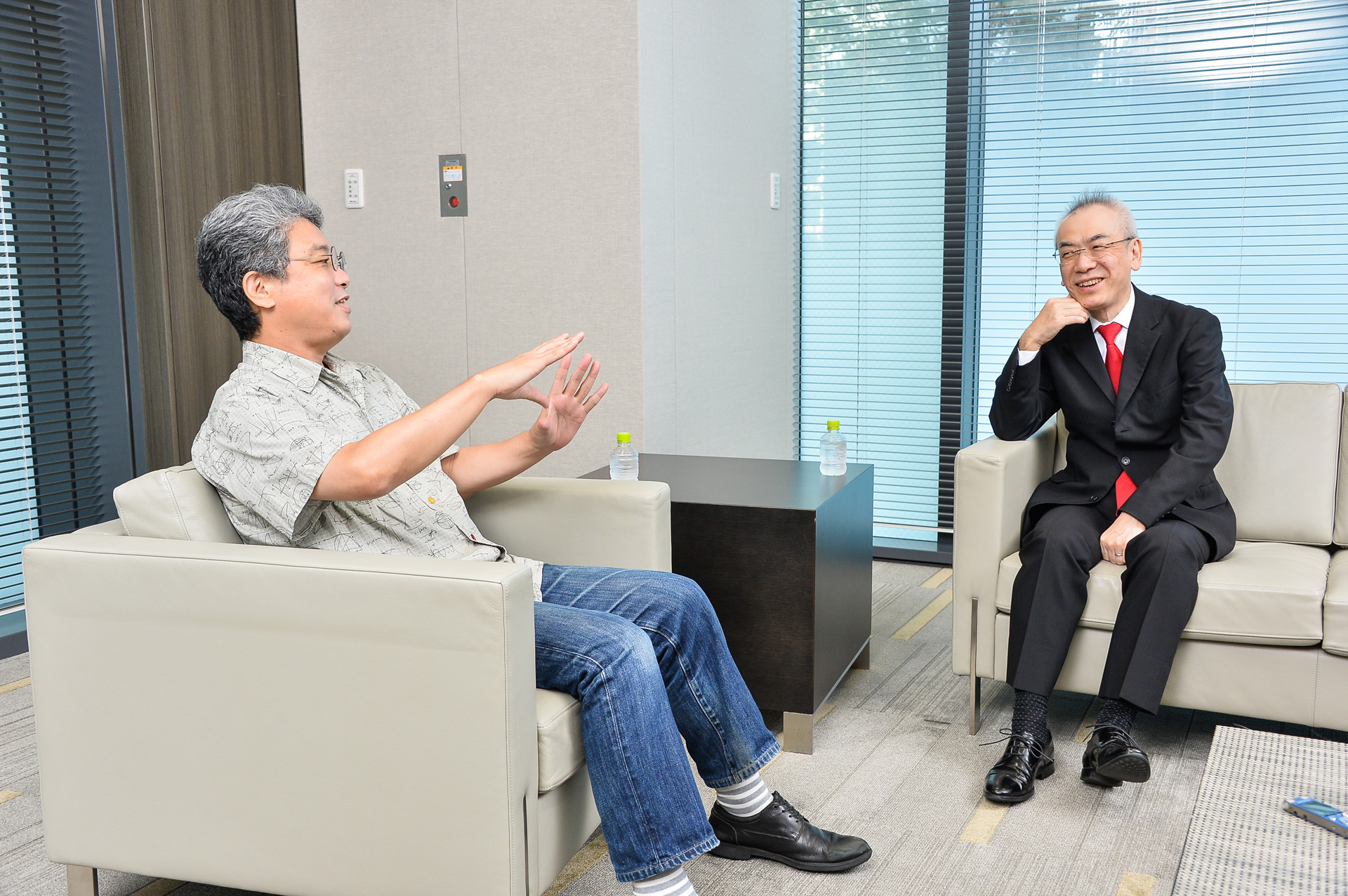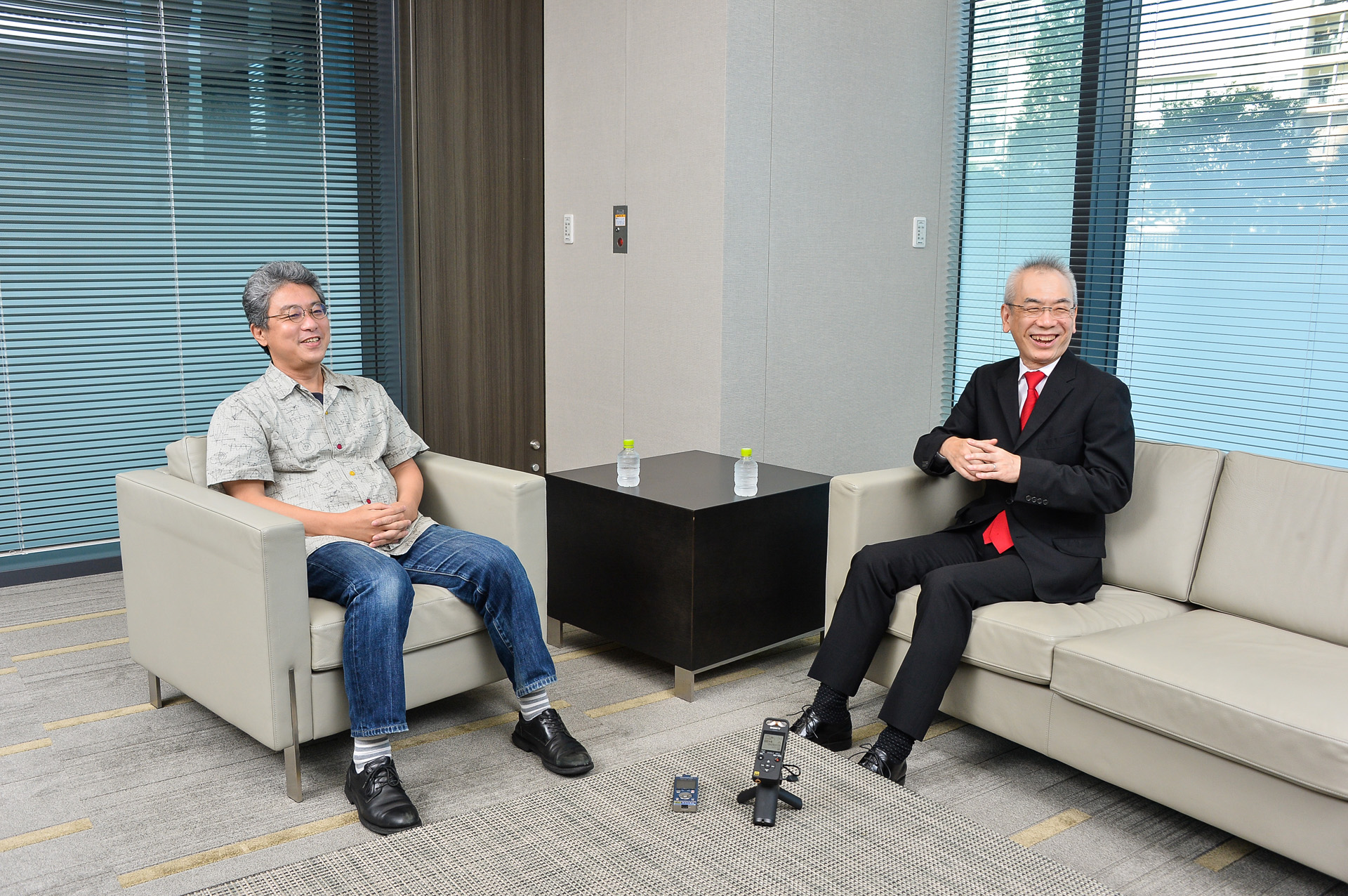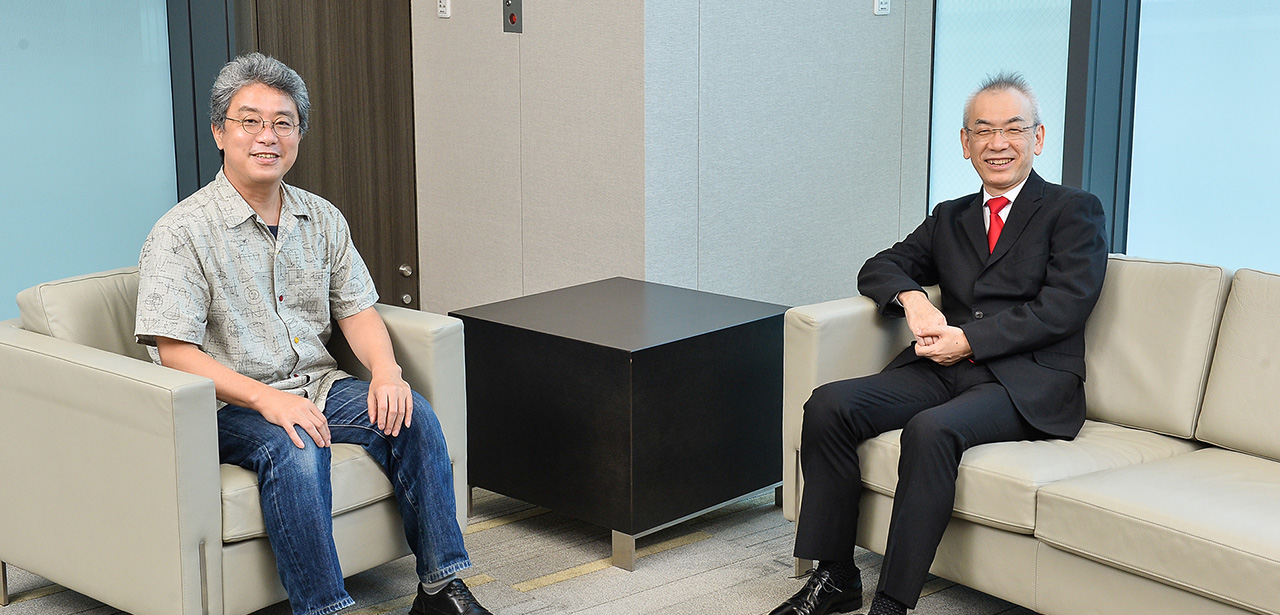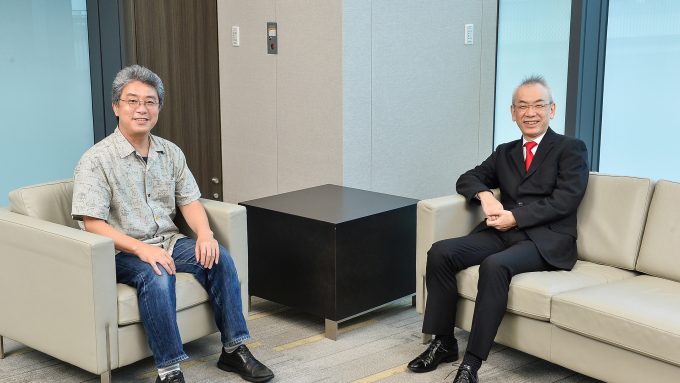“WE DISCUSS VANA’DIEL” is a series of conversations between Producer Matsui and special guests who are familiar with FINAL FANTASY XI (FFXI).
For our sixth guest, we invited Akitoshi Kawazu, the General Director of the SaGa series, who has been actively developing games since when the company was still known as Square. In this fourth and final part, he shared what his primary focuses are within game development and aspirations for the SaGa series.

Square Enix General Director of the SaGa series, who has been involved with the scenario, direction, and production of the series beginning with Makai Toushi SaGa* and Romancing SaGa. He has also been involved with the FINAL FANTASY (FF) series as a Game Designer in the original game and FFII, and as the Executive Producer of FFXII. He was also Producer Matsui's senior when they were enrolled at Tokyo Institute of Technology.
* Makai Toushi SaGa was released as The Final Fantasy Legend in North America.
MMORPGs can’t betray the players’ expectations
Mr. Kawazu, what do you believe is the reason FFXI has been able to continue for almost 20 years?
- Kawazu
Ultimately, it means FFXI has been successful in maintaining a service that their fans want. They’ve established a sort of trust between the fans and the operations team, which I think is wonderful.
What are your thoughts regarding the fact that Mr. Matsui has been the producer of FFXI since 2012?
- Kawazu
Do you ever think, “I want someone else to take over now”? (laughs)
- Matsui
I’ve been occupied with pending tasks, and before I knew it, 20 years had passed.
- Kawazu
Working on pending tasks is good, but developing a whole new game could be nice too.
- Matsui
Although we can’t really tackle large-scale projects with our current structure, I still have the opportunity for new endeavors since we can still make a lot of things through scripts.
There’s already a solid foundation in place for FFXI, so all we need to do is create the content and it can be delivered to our players straightaway. In that sense, I feel that we have a fast-paced development environment. - Kawazu
Do you have any plans for a standalone version of FFXI where you can play through the story?
- Matsui
We talked a little bit about that in our discussion with Mr. Saito* in regard to the recent announcement of DRAGON QUEST X Offline.
* Yosuke Saito, original producer of DRAGON QUEST X. - Kawazu
I bet a lot of people would want a standalone version.
- Matsui
I agree, but I also believe each player has slightly different expectations of what an offline version of FFXI should be.
- Kawazu
That’s to be expected, of course, but it’s our duty as developers to make that call.
For example, when it comes to cooking, one way is to choose what to serve based on everyone’s preferences, but professional chefs will tell you with confidence, “Here, try this! It’ll be great, I guarantee it!” - Matsui
You’re always making comparisons like that, Mr. Kawazu. (laughs)
- Kawazu
I can’t quite place what I feel, but something about FFXI and FFXIV is slightly different from other numbered titles in the FF series. It might be because they lack that standalone aspect where you simply enjoy the story on its own. I’ve always felt that adding a standalone story version could improve their recognition as numbered titles. But making them would require an insane amount of development cost, so that’s one hurdle you’d need to face.
And as you said, each player has their own vision of what an offline version of FFXI should be like, which I imagine would be intimidating for the scenario writers when adjusting the game for singleplayer. I believe the fact that FFXI and FFXIV were developed in tandem with feedback from the players is an enormous factor that sets them apart from offline games.
- Matsui
That’s true. To a greater degree than other games, MMORPGs can’t betray players’ expectations, which sets the bar really high for them.

It’s pointless without a unique experience
Over the past two decades, has anything changed in how you face the players?
- Kawazu
With multi-platform releases becoming the norm, I’ve noticed we no longer need to emphasize that aspect about our games. There are fewer platform-exclusive games compared to the past and everyone can play on their preferred platform, which I feel has allowed players to better connect with the games they play.
- Matsui
That’s definitely been a big change.
- Kawazu
Back then, games were only enjoyed by a niche minority, but now they’re a part of society.
To me, it’s like going from “occasionally dining at a fancy restaurant” to “eating hamburgers at a fast-food place.” Our job as developers is to provide the satisfaction of “fast-food,” or to deliver the thrill of being served an exquisite feast at a fancy restaurant, but players can be quite greedy and will always demand both. It’s truly difficult to meet all their demands.
A single misstep could mean a failed project and wasted development cost. On top of that, gaming trends change drastically in just a few years. You can see that with smartphone games, which have gone a completely different direction from the industry scene we had five years ago. Lately, there’s been an influx of indie developers creating raw and idea-driven games, while huge AAA titles are also garnering a lot of attention. There’s also been a lot of games designed exclusively for online play.
- Kawazu
There were also influxes where consumer consoles and retro-style games made a comeback, but there were so many retro-style games that I feel like people have gotten tired of them again.
You have to make a game that fits in these rapidly changing trends but also need to be careful to avoid throwing away too many of your own ideas. After all, creating a game you didn’t feel like making is also just a waste of development effort. It’s often said that modern times have become a war between various media vying for your attention. Nowadays, games have competitors like video streaming services and social media.
- Kawazu
In the midst of that struggle, you have to satisfy your audience in a way that only games could, which is quite the daunting task. There’s no way for us to know which path leads to success, or even what the situation will be like in the near future.
Mr. Kawazu, what are your principles as a game producer? We’d like to hear your ideas on how you face the players, as well as how you face the development team.
- Kawazu
Things seem to be fine when it comes to facing the development team. Everyone has a professional mindset and will get right to work once I provide the groundwork and explain what kind of game we’re making.
- Matsui
Isn’t there anything you have to teach them?
- Kawazu
There’s no time for that, not to mention my knowledge wouldn’t be helpful since it’s so outdated. (laughs wryly) They have to keep challenging themselves with new things, after all.
And what sort of principles do you have when facing players?
- Kawazu
Personally, I believe my games would be pointless if they didn’t deliver a unique experience. Things that can be experienced through another game or medium should be experienced through those means. In the same way, when I'm working on a remastered version of an older title, I believe elements that can only be enjoyed in the remastered version are a must-have.
What you need in order to keep creating
Looking at your career, it wouldn’t be all that strange if you had a more managerial role in the company. Is there a reason why you’ve stayed with the development workforce?
- Kawazu
That’s because I can’t handle managerial tasks. I’m not the same kind of producer as Mr. Sakaguchi*, nor can I work like Mr. Hashimoto*.
* Hironobu Sakaguchi, one of the founders of the FF series.
When it comes to making games, I’m not very good at having other people handle the tasks I can’t do. For example, let’s say there’s a soccer fan who dreams of winning in the national league championship, but isn’t a great player themselves. The only way they can fulfill their dream would be to gather teammates that have a shot at winning. But I’m not good at getting people together, which means I can only rely on my own inferior skills, so it’s impossible for me to reach a national league-level to begin with. Therefore, for me to continue to enjoy soccer in my own way, I must set my goals accordingly.
* Shinji Hashimoto, former brand manager of the FF series and Kingdom Hearts series. - Matsui
I see, so you’re able to set your own goals because you’re working on the game yourself.
- Kawazu
However, working in a company means you have to turn a profit. That entails figuring out how to generate revenue from doing what you’re passionate about. It’s also important to establish a flow where you can deliver your games to the right audience and have them take delight in the development process with you.
Sometimes economics news will have buzzwords like “The Japanese game industry is done for!” but not everyone needs to reach the national league level, and the national league certainly isn’t the only place where you can find happiness. - Matsui
I agree, not all games need to be AAA titles.
- Kawazu
Is a soccer team doomed to misery if they can never make it to the national league? Are fans of minor league teams destined for tragedy? Of course not. Though I suppose I wouldn’t know what to say if someone were to ask, “Shouldn’t you set your sights on reaching the top?”
So at first, I tell younger people to aim for the national league. They should aim for the top at least once, see how far they get, then decide what to do from there. Setting your goals low from the start is only a means of escaping adversity. The SaGa series reached its 30th anniversary in 2019. Is there anything you want to try with future SaGa games, or anything you want to do outside of the series?
- Kawazu
I plan on continuing to expand the SaGa team. I also have aspirations to embellish the series and its gaming experience, and to that end, we’d have to succeed a lot more.
Everyone in the team has challenged themselves in various areas, and I’ll also continue to do so myself. I still have a lot of games that I’d like to try making. - Matsui
What kind of games do you want to make? Perhaps something related to TRPGs?
- Kawazu
That’d be nice too. Other than that, maybe VR games, or action games, which would be completely different from my previous works.
I’d like to come up with something related to the SaGa series that isn’t an RPG but still can be enjoyed by SaGa fans. Permanently moving on to a new genre of games would be letting down fans of the older games, but it’d be nice if we could continue creating games in the traditional style while also expanding our horizons for a broader audience.
My time as a game developer is limited, so I’d like to spend much less time on each game. With that said, there’s been some projects that were supposed to be quick but just never seem to get done. (laughs wryly) - Matsui
Game development certainly takes much longer than it used to.
- Kawazu
It’s especially rough with RPGs. Just designing the setting takes half a year, and the actual creation process takes about a year or more. When you’re fleshing out the setting and gameplay, two or three years can go by like nothing.
So while I do want to try all sorts of things, I’m bottlenecked by the time it takes to create each game. - Matsui
There’s also those games that entail providing downloadable content for about a year following their release.
- Kawazu
People just aren’t satisfied without at least that much. With so many different games out there nowadays, if you release a half-baked game, it’ll disappear among innumerable titles. Considering that, we sure had it easy back in the day. (laughs)
Back then, all sorts of entertaining games were released in a short span of time. In regard to the FF series, there was essentially a new numbered title every year up to FFV.
- Matsui
Back in the day, there were hard limitations set by the ROM, so you couldn’t just create a game with no end in sight.
Whereas today, you have to set your own limitations in the beginning, or there would be no limit to what you can work on.
- Matsui
Although you can implement pretty much everything you want in a game nowadays, actually implementing everything will cause your game to lose focus. I think that would make the designers unhappy too. It’s important to establish a focus to fight towards.
It’s also important whether or not that focus matches the trends of the time it’s being released.
- Kawazu
There certainly are times when we're like, “It would've done so well if we could sell it right now!” or “This would've sold better three years ago.” Timing is certainly difficult.
- Matsui
With service titles, in a worst case scenario, the wrong timing could lead to termination. But with standalone games, couldn’t you just market them again when the time seems right?
- Kawazu
You might have to create a reason for the game to make a comeback.
- Matsui
There’s been a larger emphasis in conveying to your audience why they should specifically choose your game out of numerous others out there.
Perhaps that’s why gameplay streams and broadcasts have become popular nowadays, though they seem to have their own struggles with trying to stand out from the crowd. Influencers definitely have a huge presence nowadays.
- Matsui
While I do think we ought to do something similar ourselves instead of relying on influencers to spread the word, that sort of thing is unfamiliar territory for us..
By the way, Mr. Kawazu, if you were to create a game with limited online aspects, what would you want to create?
- Kawazu
I wonder what would suit a game based on the SaGa series. It’d be nice if you didn’t need to be constantly online in order to play, but making it completely standalone would defeat the purpose of an online game, so I'd have to think of a good compromise between the two...
Maybe something where like, there’s nothing in the beginning, but about three months into the game, you’ll see piles of corpses left behind by players who played at launch, or some other way for players to leave behind footprints to show that they were playing.
This also goes for standalone games, but the in-game world is typically entirely provided by the development team. It’d be nice if we could allow players to embellish the in-game world, but making such an activity entertaining seems really difficult. I believe there’s still a group of people who don’t feel comfortable with online games. Perhaps you could be the one to come up with a solution and create an online game for people who aren’t comfortable with online games.
- Kawazu
That would be nice. (laughs) It’d require some kind of core idea, not that I can think of one at the moment.
Finally, do you have any parting words for our readers?
- Kawazu
I believe FFXI will go on forever as long as everyone continues to visit Vana’diel, so please, tell your children and grandchildren about the game and help FFXI see its 100th anniversary. As far as I know, online games won’t end as long as there’s enough players, and I’ll be looking forward to seeing how long it’ll continue.





